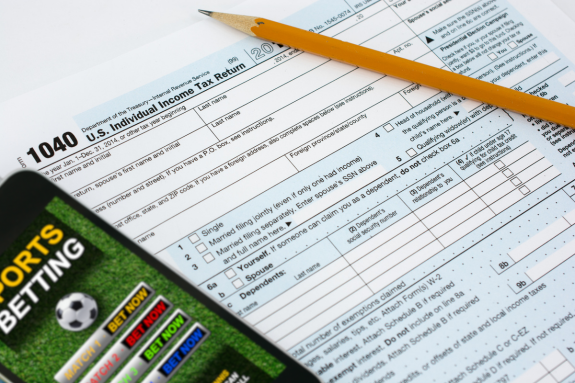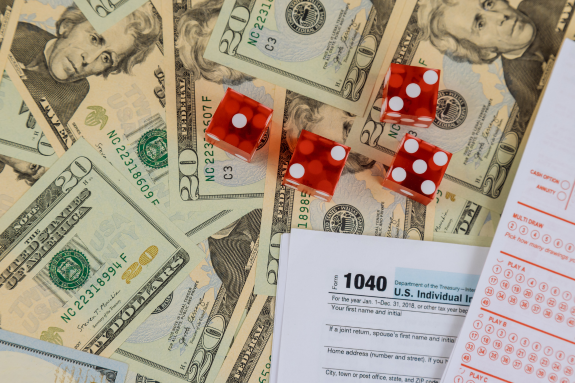Gambling can be an exciting and potentially lucrative activity, but it’s essential to understand the tax implications associated with gambling wins. In the United States, the Internal Revenue Service (IRS) imposes specific rules and regulations regarding the taxation of gambling winnings.
We explore the key points individuals should know about taxes on gambling wins in the US. Use our gambling tax calculator to determine how much tax on gambling winnings you need to pay and which tax form.
Taxable Gambling Winnings
Under the US tax code, all gambling winnings are considered taxable income. This includes winnings from casino games, lotteries, horse racing, sports betting, and other forms of gambling. This applies to residents and non-residents who win money within the country’s borders.
Sports Gambling Taxes

The tax treatment of sports betting winnings in the United States is subject to federal and state tax laws. These include:
- Federal Taxes: Sports betting winnings are taxable and subject to federal income tax. The IRS treats sports betting winnings as regular taxable income. This means they are taxed at the individual’s applicable income tax rate. The tax rates can vary depending on the individual’s total taxable income and filing status, ranging from 10% to 37% under the current tax brackets.
- State Taxes: states may impose their own taxes on sports betting winnings. The tax rates and regulations can vary significantly from state to state. Some states levy a specific percentage tax on the gross revenue generated by sportsbooks or impose a tax on individuals’ net sports betting winnings. The rates and thresholds for state taxes on sports betting winnings can differ widely. So it’s essential to check the specific regulations of the state in question.
- Local Taxes: Similar to state taxes, some local jurisdictions may also impose taxes on sports betting winnings. Local tax rates and requirements vary depending on the specific locality.
- Withholding Requirements: Regarding sports betting, the threshold for mandatory withholding of federal income tax is generally $5,000 for winnings at least 300 times the original bet amount. If the sportsbook withholds taxes from your winnings, they will issue a Form W-2G to report the amount withheld.
Gambling Winnings Tax Calculator
Calculating taxes on gambling winnings can be complex. Our free gambling tax calculator simplifies the process. Input your winnings, deductions, and losses to estimate your tax liability accurately. Whether a recreational or professional gambler, save time and ensure tax compliance with our user-friendly gambling tax calculator. Try it today!
Gambling Winnings Tax Form, Reporting, and Documentation
If your gambling winnings exceed certain thresholds, you are required to report them to the IRS. Casinos and other gambling establishment must report winnings above specific amounts to the IRS through Form W-2G. To support your tax reporting, keeping accurate records of your gambling activities, including the dates, locations, and amounts won and lost, is crucial.
When reporting gambling winnings on your tax return in the United States, you may need to use the following tax forms:
- Form W-2G: This form is used by gambling establishments to report certain gambling winnings to both the recipient and the IRS. If you win a specified amount from certain gambling activities, such as slot machines, bingo, or poker tournaments, the establishment will provide you with a copy of Form W-2G. You must report the winnings listed on this form on your tax return.

- Form 1040: The standard individual income tax return form, Form 1040, is where you report your overall income and deductions, including gambling winnings and losses. If you have gambling winnings, you’ll enter the total winnings on the “Other Income” line (Line 8) of Form 1040.
- Schedule A: If you itemize deductions rather than taking the standard deduction, you can use Schedule A (Form 1040) to report your gambling losses. Gambling losses can be deducted as an itemized deduction but are subject to certain limitations. You’ll need to provide accurate records of your gambling losses to support your deduction.
- Schedule C: If you are a professional gambler and gambling is your primary source of income, you may need to file Schedule C (Form 1040). Schedule C is used to report business income or losses, and as a professional gambler, you would report your gambling winnings and losses on this form.
Deducting Gambling Losses on Taxes
The IRS allows individuals to offset their gambling winnings with gambling losses when itemizing deductions on their federal tax returns. However, you can only deduct gambling losses to the extent of your gambling winnings. Maintaining detailed records of your losses, such as losing tickets, receipts, or other documentation, is essential to substantiate your deductions. Here are some critical steps to help you verify your gambling losses:
- Keep Detailed Records: Maintain accurate records of your gambling activities, including dates, locations, types of gambling, and amounts won and lost. Documenting each gambling session, even if it results in a loss, is essential.
- Save Wagering Tickets and Statements: Keep all wagering tickets, such as betting slips, lottery tickets, or casino receive, as evidence of your gambling activity. These documents should indicate the date, location, type of game, and the amount wagered.
- Maintain Bank and Financial Statements: Review and retain bank statements, credit card statements, and other financial records that show withdrawals or deposits related to gambling activities. These can help establish a paper trail and support your claims of gambling losses.
- Obtain Win/Loss Statements: Request win/loss statements from casinos or other gambling establishments where you have played. These statements provide an overview of your gambling activity and can be used to validate your reported losses.
- Document Non-Winning Lottery Tickets: If you play the lottery regularly, it may be helpful to retain non-winning tickets as additional evidence of your gambling losses.
- Seek Professional Assistance: Consider consulting a tax professional knowledgeable about gambling-related tax laws. They can guide you on the required documentation and help ensure you accurately report your gambling losses on your tax return.
State and Local Taxes
In addition to federal taxes, gambling winnings may also be subject to state and local taxes, depending on the jurisdiction. Each state has its own rules regarding the taxation of gambling winnings. Some impose a flat tax rate, while others use a progressive tax system. For example:

- Nevada, often referred to as the gambling capital of the United States, doesn’t impose a state income tax on individuals. Therefore, residents and non-residents are not subject to state income tax on gambling winnings. However, remember that federal taxes apply to gambling winnings earned in Nevada.
- In New Jersey, gambling winnings are subject to federal and state income taxes. The state applies a flat tax rate of 8.5% on gambling winnings exceeding $10,000. This tax is withheld by the gambling establishment before issuing the payout to the winner. Non-residents who win gambling prizes in New Jersey are also subject to the 8.5% tax on their winnings.
- California has its own set of rules for taxing gambling winnings. The state imposes a flat tax rate of 24% on all gambling winnings, regardless of the amount. In addition to the state tax, individuals in California are also required to pay federal income tax on their gambling winnings.
It’s important to note that state and local tax laws vary significantly. The examples provided are just a snapshot of the diverse tax regulations across different jurisdictions. When engaging in gambling activities, it is advisable to consult with a tax professional or refer to the specific tax laws of the state or locality in question to ensure compliance with all tax obligations.
Withholding and Reporting Requirements
When a gambling win exceeds a certain threshold, the casino or gambling establishment may withhold a percentage of the winnings as federal income tax. The threshold for mandatory withholding is generally $5,000 for slot machine winnings or $600 for table games. Even if the winnings do not meet the withholding threshold, you must still report them accurately to the IRS.
Non-Resident Aliens
Non-resident aliens who win gambling prizes in the US are subject to different tax rules. They may be subject to withholding at a higher rate of 30% or potentially lower if their country has a tax treaty with the US. Non-resident aliens should consult a professional familiar with international tax laws to understand their obligations and potential deductions.
Are there any Exceptions?
Yes, there are a few exceptions and special circumstances regarding taxes on gambling winnings in the US. Here are a couple of notable exceptions:
Professional Gambler Tax

Individuals who engage in gambling activities as a profession, such as professional poker players or sports bettors, may be treated differently for tax purposes. They can deduct gambling-related expenses, such as travel costs, entry fees, and other business expenses, from their gambling winnings. Professional gamblers must report their winnings and losses on Schedule C (Profit or Loss from Business) instead of Schedule A (Itemized Deductions).
Charitable Gambling
Some states provide exceptions or reduced tax rates for gambling winnings derived from charitable gambling events, such as raffles, bingo games, or casino nights conducted for charitable purposes. The tax treatment of such winnings may vary depending on the state, so you must check the specific regulations in your jurisdiction.
Recreational Gambling
In certain situations where gambling activities are purely recreational and infrequent, individuals may not be required to report or pay taxes on small winnings. However, it is important to note that the IRS still expects accurate reporting and compliance with tax regulations, even for smaller winnings.
Conclusion
While gambling can be a thrilling experience, it is crucial to understand the tax obligations that come with gambling winnings in the US. Awareness of reporting requirements, keeping accurate records, and understanding the applicable tax rates will help ensure compliance with IRS regulations. If you have substantial gambling winnings, consulting a tax professional can provide valuable guidance and assistance in navigating the complex tax landscape related to gambling wins.
-
Tags:








Leave a Comment